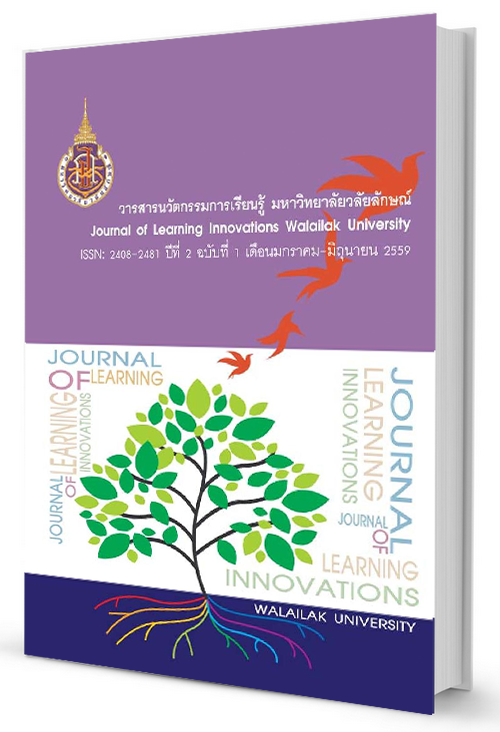Contemporary Sexuality through the Process of Experiential Learning
DOI:
https://doi.org/10.14456/jli.2016.8Keywords:
เพศวิถีร่วมสมัย, การเรียนรู้โดยใช้ประสบการณ์เป็นฐาน (Experiential Learning), Contemporary sexuality, Experiential learningAbstract
Learning about “sex” may be a difficult topic to discuss or communicate directly. At the same time, it is considered a topic to discuss secretly or privately. Because of this, the public have often formulated their own understanding of the topic which leads to wrong practices. This problem, in turn, is not only a personal problem but also a social and public problem. When adolescents become adults, they are equipped with their free thinking and self-confidence, so they tend to naively believe that their thoughts and behavior are proper, especially those concerning sexuality. The negative effects of such orientation are, for example, teen pregnancies, abortions, unwanted pregnancies, HIV infections and others. The writer and other teaching staff on the team see this as a significant problem, thus “sexuality” has been discussed and ways to introduce it to the classroom have been brainstormed. As a result, the course design, course specifications and the teaching and learning process have been developed for a course entitled “Contemporary Sexuality” by using the process of experiential learning, which takes the learning from abstract to concrete experiences, the process that is appropriate for a practical or a skill course. Experiential learning can be used with an individual learner as well as a group. The principle is the teaching should set up a learning experience plan, trigger the learners to reflect and discuss what is learned through the experience. This process of learning has been adopted on an experimental basis as a model for other course designers who may be looking for a proper design in dealing with or integrating with other issues that are related to the learners’ life and social experiences.
References
สายฝน เอกวรางกูร. (2550). พฤติกรรมเลี่ยงทางเพศ. ใน คิริพร ซัมภลิขิตและ จุฬาลักษณ์ บารมี (บรรณาธิการ) คู่มือการสอน: การสร้างเสริมสุขภาพในหลักสูตร พยาบาลศาสตร์บัณฑิต ขอนแก่น: แผนงานพัฒนาเครือข่ายพยาบาลศาสตร์ เพื่อการสร้างเสริมสุขภาพ (พย.สสส.) ระยะที่ 2. มหาวิทยาลัยขอนแก่น
สิริพร สมบูรณ์บูรณะ. (2550). นวัตกรรมการเรียนการสอน PBL กลุ่มวิชามนุษยศาสตร์ และสังคมศาสตร์. นครศรีธรรมราช: สถาบันวิจัยและพัฒนา มหาวิทยาลัยวลัยลักษณ์.
อาภรณ์ใจเทียง. (2546). หลักการสอน. (ฉบับปรับปรุง) พิมพ์ครั้งที, 3 กรุงเทพฯ: โอเตียนสโตร์.
Coffield, F., Moseley, อ., Hall, E., & Ecclestone, K. (2004). Learning styles and pedagogy in post-16 learning: A systematic and critical review.WWW.LSRC.ac.uk: Learning and Skills Research Centre. Retrieved January, 15, 2008: https://www.lsda.org.uk/files/PDF/1543.pdf.
Dewey, J. (1938). Experience and education. New York: The Macmillan Company.
Gibbons, Jill and Gray, Mel (2002). An integrated and experience-based approach to social work education: The Newcastle model. Social Work Education: The International Journal, Vol 21 (5). pp. 529-549.
Kolb, D. (1984). Experiential learning: Experience as the source of learning and development. Prentice Hall, Englewood Cliffs, NJ.
Kolb D. (1984). Experiential learning: experience as the source of learning and development. Englewood Cliffs, New Jersey: Prentice Hall.
Kolb D. (1999). The Kolb Learning style Inventory, Version 3. Boston: Hay Group.
Proudman, B. (1995). Experiential education as emotionally engaged learning. in K. Warren, M. Sakofs, & J.S. Hunt, Jr. (Eds.). The theory of experiential educotion.Dubuque. IA: Kendall/Hunt Publishing Co.
Ruben, Brent D. (1999). Simulations, Games, and Experience-Based Learning: The Quest for a New Paradigm for Teaching and Learning. Simulation & Gaming. December 30:498-505.
Downloads
How to Cite
Issue
Section
License
เนื้อหาและข้อมูลในบทความที่ลงตีพิมพ์ในวารสารนวัตกรรมการเรียนรู้ มหาวิทยาลัยวลัยลักษณ์ ถือเป็นข้อคิดเห็นและความรับผิดชอบของผู้เขียนบทความโดยตรง ซึ่งกองบรรณาธิการวารสาร ไม่จำเป็นต้องเห็นด้วย หรือร่วมรับผิดชอบใดๆ
บทความ ข้อมูล เนื้อหา รูปภาพ ฯลฯ ที่ได้รับการตีพิมพ์ในวารสารนวัตกรรมการเรียนรู้ มหาวิทยาลัยวลัยลักษณ์ ถือเป็นลิขสิทธิ์ของวารสารนวัตกรรมการเรียนรุ้ มหาวิทยาลัยวลัยลักษณ์ หากบุคคลหรือหน่วยงานใดต้องการนำทั้งหมดหรือส่วนหนึ่งส่วนใดไปเผยแพร่ต่อเพื่อกระทำการใดๆ จ้อต้องได้รับอนุญาตเป็นลายลักษณ์อักษรจากวารสารนวัตกรรมการเรียนรู้ มหาวิทยาลัยวลัยลักษณ์ก่อนเท่านั้น

